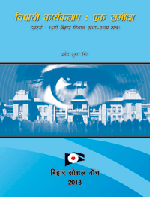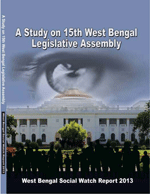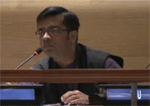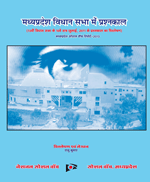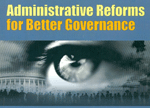India
Published on Mon, 2013-12-30 23:00
Bihar Social Watch Report 2013 ‘Functioning of Legislative Assembly: An Analysis’ |
Published on Thu, 2013-12-19 13:46
The National Social Watch Report on Governance and Development 2013, released today in Delhi, highlighted that 31% of MPs in Lok Sabha has pending criminal cases against them. The average salary package of each MP is 68 times higher than the percentage income in the country and total value of assets of 4 MPs is Rs. 29.2 billion. This report was released by Honorable Justice Ananga Patnaik, Supreme Court of India and Shri Satyanand Mishra former Chief Information Commissioner, Central Information Commission. Chief Guest Justice Ananga Patnaik said “this report gives an overview of our institutions”. He further added that giving only statistics would not work with parliamentarians and legislators. Give them suggestions as well. They may not accept them today and tomorrow they will be accepted. |
Published on Thu, 2013-12-05 14:55
West Bengal Social Watch releases a Citizen’s Report on the performances of the 15TH West Bengal State Legislative Assembly till date. West Bengal Social Watch organized a ‘Discussion Meet on Current State of Affairs vis-à-vis Role of Citizens’ on November 30, 2013. Shri Chittotosh Mukherjee, former Chief Justice of Kolkata & Mumbai High Courts participated in the Press Conference hold on November 30, 2013. |
Published on Thu, 2013-12-05 08:16
West Bengal Social Watch Report 2013 A Study on 15th West Bengal Legislative Assembly |
Published on Thu, 2013-10-03 14:55
Speaking at the UN General Assembly articulating the Indian civil society aspirations on actions to make the new development agenda work in developing nations that are home to 85 percent of the world's poor, Amitabh Behar representing National Social Watch (India) and Wada Na Todo Abhiyan emphasized that, “for the new development agenda to succeed, we need to move away from a poverty lens to a more holistic justice frame.” The new development frame will succeed the current Millennium Development Goals (MDGs) that expire in 2015. Mr. Amitabh Behar, a representative of a coalition of 4,000 Indian civil society organisations under the umbrella National Social Watch and Wada Na Todo Abhiyan, voiced the civil society concerns related to the new development agenda at the UN Special Event on MDGs at the 68th General Assembly in New York on September 25. |
| Published on Sun, 2013-07-07 00:00 |
Published on Thu, 2013-05-02 10:55
Unlike many developing countries, India’s economy has been growing at a fast pace, enabling the government to mobilize the necessary resources internally for the achievement of the Millennium Development Goals (MDGs) by 2015. Its dependence on international aid, especially for financial resources is minimal; in fact it has declined bilateral aid from many countries. Despite this, however, the country has failed to achieve most of the goals and targets. The main reasons for this are inadequate funding, inappropriate administration and ignorance of policy and governance issues. Ultimately however, the failure is due to the absence of inclusiveness in the development model. Instead of enabling people to acquire basic needs such as food, sanitation, water, health care, the government is promoting ‘non-inclusive growth’ and has sought to provide basic services through subsidies with the associated problems of inefficiency and corruption. |
|
Unlike many developing countries, India’s economy has been growing at a fast pace, enabling the government to mobilize the necessary resources internally for the achievement of the Millennium Development Goals (MDGs) by 2015. Its dependence on international aid, especially for financial resources is minimal; in fact it has declined bilateral aid from many countries. Despite this, however, the country has failed to achieve most of the goals and targets. The main reasons for this are inadequate funding, inappropriate administration and ignorance of policy and governance issues. Ultimately however, the failure is due to the absence of inclusiveness in the development model. Instead of enabling people to acquire basic needs such as food, sanitation, water, health care, the government is promoting ‘non-inclusive growth’ and has sought to provide basic services through subsidies with the associated problems of inefficiency and corruption.
The organized sector, which provides quality employment, employs only 12% to 13% of the workforce. The remaining 87% are relegated to agriculture and the informal sector with low and uncertain earnings. The crisis in agriculture, seen in the millions of farmers’ suicides, is now being exacerbated by climate change. Although the government has prepared an ambitious climate change action plan, the focus so far in implementing the plan is limited to investment and technology, ignoring critical issues such as equity, institutional capacity and good governance.
|
Published on Mon, 2013-04-22 14:23
Bangalore - After independence, we got bureaucracy not democracy, said Bhaskar Rao Gorantla, Research Director of National Social Watch (India). He was addressing a gathering of civil society representatives at a consultation programme organized by the Karnataka Social Watch on administrative reforms. Listing various structural problems in the administration, he said that although the central and state level administrations have undergone a positive change since independence, the district/local level administrative bodies have not undergone any significant changes. |
| Source: . Published on Fri, 2013-02-08 23:00 |
SUSCRIBE TO OUR NEWSLETTER

